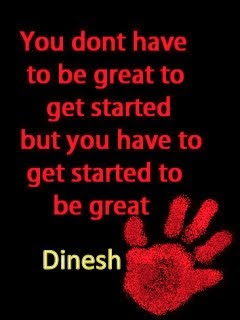 Dears,
Dears,- Sometimes putting money into a 5 yr plan may seem unwise therefore it is better to opt for small investments - quick steps. The return on these little investments can be used to further greater expansion. So one should therefore opt for a 6 months to one year project and then continue from there on.
- Every organization needs to establish its goals clearly. From then on it has to decide at which point it actually is and where it really wants to see itself after its CRM implementation.
- It is imperative that the organization have a long-term commitment to the CRM project and be willing to invest the required amount of effort time and money to obtain necessary results. The organization should not expect a return on investment too soon. Expecting a short return on investment say 6 months will have detrimental affects.
- The average implementation time for organizations that implement most CRM solutions is 16 to 24 weeks while the industry average hovers greater than 10 months. An organization that implements CRM should expect full ROI in 10 months.
- After the implementation of the strategy CRM focus should be on customer interactions and using this to meet customer needs. What's most important is to build and launch, then improve, rather than spend months in preparation before the initial launch.
So what's the best option? Do organizations opt for a one time plan or a phased implementation strategy? Opting for phased implementation is certainly more beneficial and is the better choice of the two.
Guidelines For Successful Phased Implementation:
Ease Slowly into CRM Implementation
Establish your business needs first. Next companies need to establish a CRM project that has a short delivery period so that the project can be delivered in a short timeframe. It is better to opt for phased implementation, small individual projects than a mammoth one. This will ensure that there is adequate return on investment and that there is considerable cost reduction and efficiency.
CRM Package vs. Business Needs
It is important to ensure that the best balance is obtained between the CRM solution and the actual use of it. At most times businesses find that they are adjusting their business processes and goals to the CRM package and vice versa. An effort should be made to make use of the CRM tools to the best of its ability while at the same time accommodating business processes.
Get Management Involved
CRM executives and top management should be involved. Their participation is critical to the achievement of CRM goals and objectives. The CRM committee appointed or the CRM manager should actively participate in all aspects of the CRM implementation from the inception to the deployment. Responsibility should be given to the appropriate persons and ensured that they carry it through and thereby avail of all the possible CRM benefits.
Training is Essential
Training should be taken seriously. Since the implementation of CRM is a huge task it is important to plan for individual training within the organization for ex. classroom training, expert training etc can be opted for so that they are enabled to possess the necessary skills required for the job. This is an important part of CRM implementation. Employees should be encouraged to provide feedback on how well the CRM training has gone and whether or not they need additional help.
Implementing CRM
Make sure the business is affected to the barest minimum. See what effects the CRM implementation will have on your business and make sure you prepare employees for the possible jolts. It is most important to focus on the process and allow the CRM tool to manage the process. It is also important to include the entire business even if the CRM project includes only one business unit.
Future Focus
Since the CRM implementation will bring with it new changes and new challenges it is imperative that the resources at hand be used to deal adequately with possible change. It is important to focus on the possibility that changes will undoubtedly occur in future. Plans should be made keeping this in mind. Room should be provided for modifications and the possibility of plans going awry as well. The business should be well equipped to deal with these changes.
Get Feedback from Users
Obtaining user feedback is essential as this can contribute to the success of the CRM project. It yields valuable information about CRM implementation's requirements user acceptance, etc. While considering implementing the CRM strategy the adherence to the above factors will go a long way in ensuring success. Getting CRM right will ensure that customer retention is secured, sales leads are followed and marketing is boosted.After the execution of CRM the results need to be measured often, based on the methodology developed. It is important to ensure that current metrics are established. Both qualitative and quantitative measures should be adopted, after which the results need to be analyzed and finally based on this a methodology should be implemented.
Your Partner and Companion
DC*

No comments:
Post a Comment